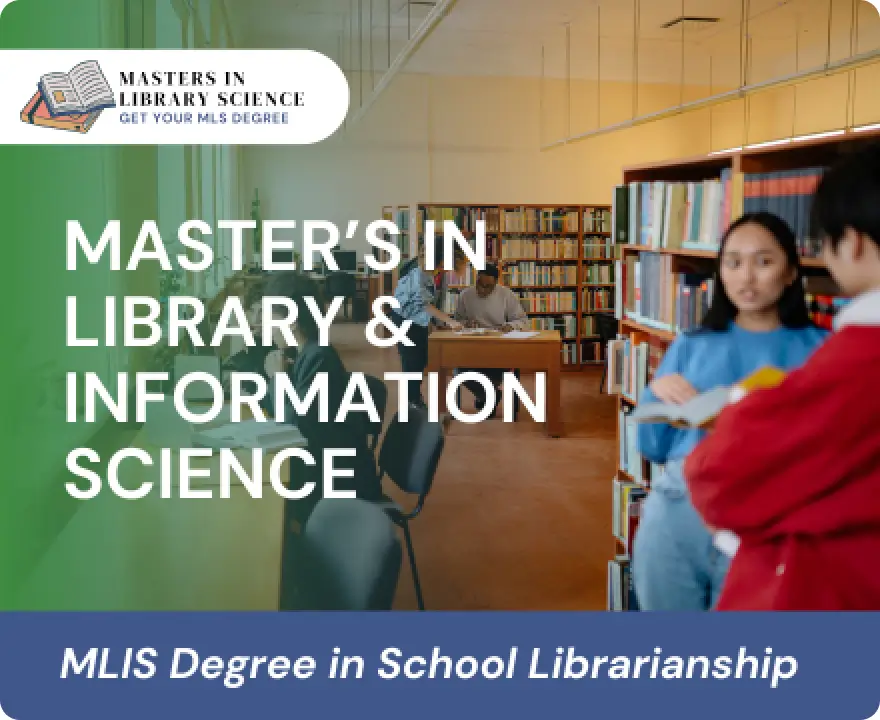Master's in Library Science in School Librarianship Degree Online
Find the best online School Librarianship MLIS program for you
- What is a Master’s in School Librarianship?
- Admissions Requirements for a Master’s Degree in School Librarianship
- What Classes Will I Take in a School Librarianship Program?
- Careers in School Librarianship
- Online School Librarianship MLIS Degree Programs
- Finding the Right Online MLIS Degree for School Librarianship
What is a Master’s in School Librarianship?
A Master’s in School Librarianship is an advanced degree designed to equip students with the skills necessary to manage school libraries and support the academic needs of students and educators. School librarianship goes beyond traditional library management, focusing on educational resources, teaching strategies, and creating an inclusive learning environment for all students. School librarians work as educational partners with teachers, helping to design lesson plans, curate digital and physical resources, and guide students in developing critical thinking and information literacy skills.
School librarianship is a rewarding field that contributes to students’ academic success and growth. According to the U.S. Bureau of Labor Statistics (BLS), school librarians and library media specialists play an important role in helping young people find information for both academic and personal development. They foster an environment where students can access materials not always available at home, supporting educational equity. School librarians are essential to building students’ research abilities, digital literacy, and a lifelong love for reading.
A Master’s in Library Science (MLIS) with a specialization in School Librarianship prepares professionals for impactful careers in elementary, middle, and high school libraries, where they support the educational and informational needs of students and teachers. School librarians, also known as library media specialists, are integral to fostering literacy, developing research skills, and promoting a lifelong love of learning among young people. They manage collections, create engaging programs, teach students and faculty how to navigate information resources, and help develop curricula that incorporate literacy and research skills. This degree is ideal for those who are passionate about education, literacy, and supporting youth development in an academic setting.
Admissions Requirements for a Master’s Degree in School Librarianship
Admissions requirements for an MLIS degree in School Librarianship are similar to those of other library science programs, though applicants may also need to meet additional requirements specific to educational settings.
- Bachelor’s degree from an accredited institution, typically in any field
- Minimum GPA requirement, often 3.0 or above
- Statement of Purpose outlining the candidate’s interest in school librarianship and career goals
- Professional resume or CV that highlights relevant experience in educational or library settings
- Letters of recommendation (usually 2-3) from academic or professional sources who can attest to the candidate’s potential in an educational library setting
- GRE scores (some programs may waive this requirement)
- Teaching Certification: Some programs may require applicants to hold or be eligible for a teaching certification, as school librarians often need certification in addition to an MLIS degree
- English language proficiency (e.g., TOEFL or IELTS) for international students
English language proficiency (e.g., TOEFL or IELTS) for international students
What Classes Will I Take in a School Librarianship Program?
An MLIS program in School Librarianship includes foundational library science coursework along with specialized classes that focus on the unique aspects of managing school libraries, supporting students, and working within educational frameworks. Most programs require 30-45 credit hours, and students may complete a practicum or internship in a school library to gain real-world experience.
- Foundations of Library and Information Science
- Children’s and Young Adult Literature: Focuses on curating age-appropriate collections that engage young readers and support school curricula.
- Information Literacy and Research Skills: Teaches methods for developing students’ research abilities and helping them locate, evaluate, and use information effectively.
- Educational Technology for School Libraries: Explores the use of digital tools and resources to support learning and engagement in school libraries.
- Instructional Strategies for School Librarians: Covers teaching methods for school librarians who work with students and teachers, including lesson planning and collaboration.
- Library Collection Development for Schools: Emphasizes curating collections that align with school curricula and meet the developmental needs of students.
- Library Media Management: Teaches students how to manage library operations, including budgeting, resource management, and library policies.
- Ethics and Privacy in School Libraries: Addresses ethical considerations specific to school libraries, such as student privacy and access to diverse resources.
- School Library Practicum: Provides hands-on experience in a school library, where students apply their knowledge in a real educational setting.
This curriculum prepares students to work effectively in school environments, equipping them with skills to support students’ educational journeys through well-curated collections, innovative programming, and instructional support.
Online School Librarianship MLIS Degree Programs
An online MLIS degree with a focus on School Librarianship provides flexibility for students who wish to balance their studies with other commitments. Online programs offer the same rigorous curriculum as on-campus programs, with courses in children’s literature, digital literacy, instructional strategies, and library management. Interactive features, such as virtual discussions, digital library resources, and online workshops, ensure that students receive a comprehensive education.
Some online programs include options for local practicums or internships, allowing students to gain hands-on experience in nearby school libraries. This practical training is essential, as it helps students build the skills they need to work effectively in school settings. Graduates of online programs are also well-versed in digital tools and resources, which are increasingly important in school libraries that support remote learning and digital literacy.
Finding the Right Online MLIS Degree for School Librarianship
When selecting an online MLIS program in School Librarianship, students should consider factors such as tuition, program length, accreditation, and support for certification requirements. Tuition can vary widely, ranging from $12,000 to $35,000, depending on the institution and program. Financial aid, scholarships, and assistantships are often available to help offset costs. Program length is also a key consideration, with most full-time programs taking 1-2 years to complete, while part-time options may extend the timeline for those needing more flexibility.
Certification requirements are particularly important for school librarians, as many states require school librarians to hold a teaching certification or pass standardized exams, such as the PRAXIS II Library Media Specialist test. Prospective students should research each program’s certification support and career resources, as well as its connections with school districts or educational organizations. By thoroughly researching these aspects, students can find a program that aligns with their career goals and prepares them to succeed as school librarians who make a difference in students’ lives.
Finding the Right Online MLIS Degree for School Librarianship
When selecting an online MLIS program in School Librarianship, students should consider factors such as tuition, program length, accreditation, and support for certification requirements. Tuition can vary widely, ranging from $12,000 to $35,000, depending on the institution and program. Financial aid, scholarships, and assistantships are often available to help offset costs. Program length is also a key consideration, with most full-time programs taking 1-2 years to complete, while part-time options may extend the timeline for those needing more flexibility.
Certification requirements are particularly important for school librarians, as many states require school librarians to hold a teaching certification or pass standardized exams, such as the PRAXIS II Library Media Specialist test. Prospective students should research each program’s certification support and career resources, as well as its connections with school districts or educational organizations. By thoroughly researching these aspects, students can find a program that aligns with their career goals and prepares them to succeed as school librarians who make a difference in students’ lives.
How Long Does It Take to Complete a Library Science MLIS Program in School Librarianship?
A degree in School Librarianship typically requires 2 years of full-time study, though additional certification requirements (like a teaching credential) may extend the timeline to 2.5-3 years. Part-time students often take up to 4 years to finish the program.
Internship Requirements for Completing a MLIS in School Librarianship
Internships are often required to meet state certification requirements. Students work in K-12 school libraries, assisting with lesson planning, literacy programming, and information literacy instruction. These internships typically involve 150-200 hours of work, providing hands-on experience in educational environments and preparing students for teaching roles.
Careers in School Librarianship
Graduates with an MLIS in School Librarianship have diverse career options in elementary, middle, and high school libraries, where they contribute to students’ academic growth and foster a love of learning. School librarians not only manage library collections but also serve as educators who support teachers and students with research, technology, and curriculum resources. Here are some common career paths in school librarianship, along with average salaries and examples of potential employers, based on data from the Bureau of Labor Statistics (BLS).
- School Librarian and Library Media Specialist: School librarians, also called library media specialists, manage school libraries, assist students with research, teach information literacy, and support teachers with classroom resources. They create an engaging environment for students to learn and explore.
- Average Salary for a School Librarian: $64,370 annually (2023 BLS data)
- Organizations Hiring School Librarians: Elementary schools, middle schools, high schools, private and public school districts
- Educational Technology Librarian: Educational technology librarians focus on integrating digital resources and technology into school libraries. They teach students and teachers how to use digital tools for research, educational projects, and digital literacy.
- Average Salary for a Educational Technology Librarian: $55,000 – $70,000 annually
- Organizations Hiring Educational Technology Librarians: School libraries, educational technology centers, public school systems
- Curriculum Librarian: Curriculum librarians collaborate with teachers and administrators to develop library collections and instructional materials that support classroom learning and align with educational standards. They play a crucial role in ensuring that library resources meet academic goals.
- Average Salary for a Curriculum Librarian: $60,000 – $75,000 annually
- Organizations Hiring Curriculum Librarians: Public and private schools, school districts, educational resource centers
- Children’s Literacy Specialist: Literacy specialists work with young children to develop reading skills and promote early literacy through programs and reading initiatives. They often develop activities, reading lists, and workshops to engage young readers.
- Average Salary for a Children’s Literacy Specialist: $50,000 – $65,000 annually
- Organizations Hiring Children’s Literacy Specialists: Elementary schools, school libraries, literacy-focused nonprofits
- Library Program Coordinator: Library program coordinators organize and manage educational programming, such as reading initiatives, literacy workshops, and research skills training, to support students and teachers. They work to make the library a central resource for learning.
- Average Salary for a Library Program Coordinator: $55,000 – $70,000 annually
- Organizations Hiring Library Program Coordinators: School districts, educational nonprofits, public school systems
The demand for school librarians and library media specialists remains steady, as they are essential in promoting literacy and educational access for young people. According to the Bureau of Labor Statistics, the median pay for school librarians is competitive, and there is projected growth in the field, with about 13,300 openings annually for librarians and media specialists across all educational levels. School librarians are critical to student success, supporting teachers and students alike with research resources, technology, and educational programs.




Master’s in Library & Information Science
Online MLIS Degrees
- Best Online MLIS Degree
- Archival Studies Degree Online
- Academic Librarianship Degree
- Children & Youth Services Degree
- Cultural Heritage Preservation Degree
- Digital Libraries Degree
- Law Librarianship
- Public Librarianship Degree
- School Librarianship Degree
- Book Arts Degree
- Music Librarianship Degree
- Records Management
